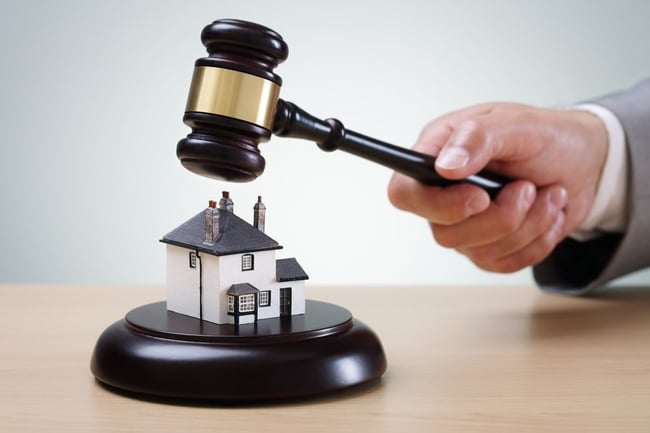Scura, Wigfield, Heyer, Stevens & Cammarota Blog
- Blog
The Automatic Stay and its Effect on Foreclosure Actions

Many people file for bankruptcy to protect their real property from being foreclosed on. There is a specific section within the Bankruptcy Code that mandates that creditor collection actions against property of the debtor must cease immediately upon the filing of the bankruptcy. This blog will explore that section of the bankruptcy code and how parties can avoid a creditor obtaining relief from that section.
THE AUTOMATIC STAY
Section 362 of the Bankruptcy Code provides for the automatic stay in a bankruptcy case, which halts creditor collection actions. As it pertains to the continuation of foreclosure actions against real property of the debtor, it provides a stay as to “any act to obtain possession of property of the estate or of property from the estate or to exercise control over property of the estate.” The ‘estate’ refers to all property interests of the debtor, as set forth in Section 541 of the Bankruptcy Code. Therefore, a foreclosure action, regardless of what stage it is in, cannot continue upon the filing of a bankruptcy filing.
If a foreclosure action were to continue despite the automatic stay being in place, then that creditor would be in violation of the automatic stay rendering actions taken void. In the event that the creditor has knowledge of the bankruptcy and violates the automatic stay, then that creditor will have committed a willful violation of the automatic stay. Punishments for a willful violation of the automatic stay can be severe. However, it is important to note that real property is no longer property of a debtor’s bankruptcy estate once a sheriff sale is completed. Therefore, it is essential that the bankruptcy filing occur prior to the sheriff sale, if the call is to retain the real property.
A CREDITOR’S ABILITY TO GET RELIEF FROM THE AUTOMATIC STAY
Section 362(d) of the Bankruptcy Code provides the creditor with rights as to how to obtain relief from the automatic stay if it can meet specific statutory requirements. Generally, in an individual bankruptcy case, sections 362(d)(1) and (d)(2) are the most commonly utilized sections by creditors seeking to obtain relief from the automatic stay. These sections state that “[o]n request of a party in interest and after notice and a hearing, the court shall grant relief from the stay provided under subsection (a) of this section, such as by terminating, annulling, modifying, or conditioning such stay-(1) for cause, including the lack of adequate protection of an interest in property of such party in interest; (2) with respect to a stay of an act against property under subsection (a) of this section, if- (A) the debtor does not have an equity in such property; and (B) such property is not necessary to an effective reorganization.”
The analysis of Section 362(d)(2) is much simpler in that it is an analysis of whether a property has equity and is necessary for an effective reorganization. Typically speaking, a court will be hard pressed to find that a personal residence is not necessary for an effective reorganization (in a chapter 13 or chapter 11 reorganization context). Therefore, Section 362(d)(2)(B) will apply more towards investment properties.
For purposes of Section 362(d)(1), cause is not defined in the Bankruptcy Code and is dependent on the circumstances of the case. However, it is important that a secured creditor is adequately protected during the bankruptcy case to keep the automatic stay in place. Forms of adequate protection include equity in property and/or monthly payments to the creditor during the pendency of the bankruptcy case.
If you are considering filing for bankruptcy, it is important to contact an experienced New Jersey bankruptcy attorney to guide you through your options and present you with the potential pitfalls. For questions regarding a potential bankruptcy, call the law firm of Scura, Wigfield, Heyer, Stevens & Cammarota, LLP for a free consultation.

David E. Sklar
Prior to joining Scura, Wigfield, Heyer, Stevens & Cammarota, LLP, David Sklar graduated from Rutgers University-Newark School of Law with a J.D., Cum Laude. Mr. Sklar was the recipient of a Pro Bono Award and was honored by the New Jersey Bar Association for his commitment to the Street Law Program by being awarded the Street Law Prize.
Share Article
Need Help? Contact Us Today!




Lists by Topic
- Bankruptcy (310)
- Personal Injury (89)
- Chapter 13 (50)
- Chapter 7 (50)
- Debt Management (50)
- Foreclosure (47)
- Accident (28)
- Car Accident (25)
- Chapter 11 (24)
- Business Bankruptcy (19)
- Credit (18)
- Insurance Claims (16)
- Business Law (11)
- Employment Law (11)
- Litigation (11)
- Probate and Estate Law (11)
- Attorney (10)
- Consumer Bankruptcy (10)
- Damages (10)
- Medical (10)
- Product Liability (10)
- Divorce (8)
- Workers Compensation (8)
- Slip and Fall (6)
- Commercial & Residential Real Estate (5)
- Premises Liability (5)
- Repossession (5)
- wrongful death (5)
- Contracts (4)
- Family Law (4)
- Video | Bankruptcy (4)
- Bankruptcy Cost (3)
- Corporate Litigation (3)
- Trial Law (2)
- student loans (2)
- tax (2)
- Attorney Fees (1)
- COVID-19 (1)
- Certified Civil Trial (1)
- Custody (1)
- Dog (1)
- Dog Bites (1)
- News (1)
- Relocation Assistance (1)


